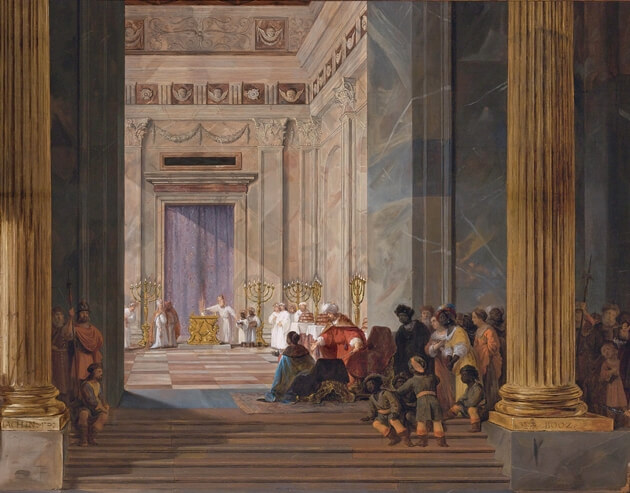
How can we awaken within ourselves the feelings of ahavah and yirah, love and awe of God?
The House and the Inner Sanctuary
We begin the morning prayers with a verse that describes our place of prayer as a bayit, a house, as well as a heichal, a sanctuary:
וַאֲנִי — בְּרֹב חַסְדְּךָ, אָבוֹא בֵיתֶךָ. אֶשְׁתַּחֲוֶה אֶל-הֵיכַל-קָדְשְׁךָ, בְּיִרְאָתֶךָ.
As for me, in Your abundant loving-kindness I will enter Your house. I will prostrate myself toward Your holy sanctuary, in awe of You (Psalms 5:8)
What is the difference between “Your house” and “Your holy sanctuary”? What is the significance of these two images as we prepare to pray?
Our bayit is our domain, our private castle where we are in control. “Whatever the homeowner says, [the guest should] obey” (Pesachim 86b). When we speak of “God’s house”, we are reflecting on God as the One who governs and rules over the universe.
The inner sanctum of a heichal, on the other hand, implies much more than just rule and control. The word heichal suggests majestic splendor and honor, as befits a royal personage.
Given this understanding of these two terms, one would assume that the mental image of God’s house will generate a sense of yirah, as we recognize and submit to God’s reign over the world.
The beautiful splendor of the sanctuary, on the other hand, should inspire ahavah, our love and yearning to be near to God.
But in fact, the verse says the exact opposite. The psalmist says that he approached God’s house with an awareness of God’s abundant loving-kindness; and he is overwhelmed with feelings of awe and reverence when encountering His sanctuary. Why is that?
Elevated Yirah
For lofty individuals, the traits ahavah and yirah are revealed differently.
These great souls recognize the great measure of chesed that is revealed in God’s providence in the world. They are able to perceive God’s reign as a rule that is purely for the sake of giving and loving-kindness. The image of the world as God’s bayit reflects a recognition of God’s infinite kindnesses in governing the world. This awakens a deep love and appreciation for this overwhelming trait of chesed.
On the foundation of this awareness of boundless kindness, we arrive at a higher awareness of sublime majesty, as we advance from the Holy to the Holy of Holies, from the House to the Inner Sanctuary — the heichal. This awareness elevates us from the trait of chesed (and its resultant outpouring of love) to feelings of awe and reverence. This is not the ordinary level of yirah, which is acceptance of God’s ultimate control and dominion; this is a higher yirah, an awe that has been refined by inner wisdom and insight.
Now we may fully understand the two stages described in the verse.
-
"In Your abundant loving-kindness, I enter Your house.” I approach God filled with a deep love, aware of the abundant measure of Divine chesed in the world. This ahavah is based on a preliminary level of yirah, a reverence that recognizes God’s control and dominion over His house/world.
-
This love leads to a higher state of awe. "I will prostrate myself toward Your holy sanctuary, in awe of You.” This elevated reverence is the result of my awareness of the heichal, the Divine splendor and noble perfection revealed in God’s inner sanctum. I am overcome by a profound sense of yirah, an elevated awe that is permeated with an inner kernel of love.
(Adapted from Olat Re’iyah vol. I, pp. 43-44)